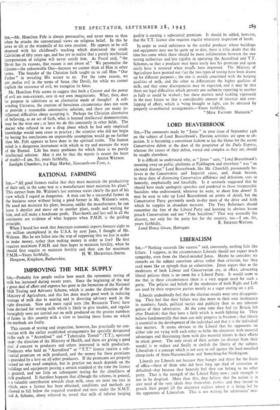SIR, —Mr. Hamilton Fyfe is always provocative, and never more so
than when he attacks the conventional views on religious belief. In this he SIR,—Mr. Hamilton Fyfe is always provocative, and never more so than when he attacks the conventional views on religious belief. In this he
loves to tilt at the windmills of his own creation. He appears to be still obsessed with his childhood's teaching which dominated the crude Calvinism of fifty years ago, and has yet to realise that a purely intellectual interpretation of religion will never satisfy him. As Pascal said, " the Heut has its reasons, that reason is not aware of." We personalise the Creator—the unknowable One—because we cannot think of Him in other terms. The founder of the Christian faith taught us to call Him " Our Father " in revealing His nature to us. For the same reason, we per ,malise evil in the terms of Satan (the Devil), for while we cannot explain the existence of evil, we recognise its force.
Mr. Hamilton Fyfe seems to suggest that both a Creator and the power of evil are non-existent, save in our own imaginations. What, then, does he propose to substitute as an alternative mode of thought? A self- winding Universe, the creation of fortuitous circumstance does not seem to provide a reasonable constructive solution, and there are many in- tellectual difficulties about accepting it. Perhaps the Christian alternative of believing, as an act of faith, what is beyond intellectual demonstration, may be the wise one ; at least we do this constantly in other fields. The doctor who refused to use a drug about which he had only empirical knowledge would soon cease to practice ; the scientist who did not begin by basing his conclusions on unprovable assumption would go no further than Mr. Fyfe appears to have done in the spiritual realm. The human mind is a dangerous instrument with which to try and measure the ways of the Eternal. Life has many problems for which there is no purely intellectual solution. May it not be that the mystic is nearer the heart


























 Previous page
Previous page